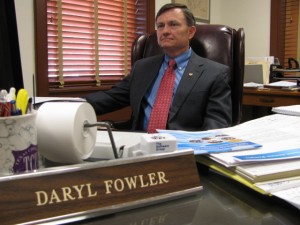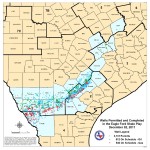Trickle Down: Counties Say Oil Money for Roads Not Enough

Texas Dept. of Transportation
Traffic accidents have surged along with drilling in Texas counties.
In what were some of the poorer counties in Texas, a surge in oil & gas drilling has set local economies on fire. But at the same time, officials have made dire pleas for help, saying the drilling boom is destroying roads and leading to deadly crashes.
The Associated Press found that while traffic deaths are down statewide in Texas, they’re up 18 percent in counties with lots of drilling.
“Unfortunately, one of the biggest growing pains and consequences of all this activity has been the increased number of fatalities that have taken place in these areas. We need to work on these roads, make them wider, make them safer,” said State Sen. Carlos Uresti (D-San Antonio), who represents some of the most oil-rich counties.
Uresti authored a bill passed last year by the legislature that provides $225 million to repair county roads torn up by heavy trucks servicing thousands of oil & gas wells. But counties say it will take far money more to actually meet their needs.
“Combined, they applied for a total of $1.1 billion dollars,” said Lonnie Hunt, with the Texas Association of Counties. “The total need is more than that. That’s on the low side.”
Lawsuit Over Funding Formula
Counties statewide can apply for the funds. The Texas Department of Transportation (TxDOT) then uses a formula which gives more money to those with the greatest oil & gas production. One of the state’s biggest oil-producing counties, La Salle County, has now sued TxDOT, faulting the formula and suggesting that some counties are getting funds without meeting requirements, leaving less for those that have suffered the most damage.
In DeWitt County (Texas’ 4th biggest oil producer, 6th biggest for natural gas), County Judge Daryl Fowler has been a leading advocate for road repair funding.
“We have not received a penny yet. But the expectation is we’ll utilize $4.9 million of state grant funding over the next year,” Fowler told StateImpact Texas. “We’re just now completing the paperwork and getting it over to the proper authorities.”
That $4.9 million DeWitt County expects to receive amounts to just 2.1 percent of the $229 million dollars in severance tax (what Texas calls the state tax on oil & gas production) that wells in DeWitt County generated in 2013 alone.
It’s the first time in decades that any share of the severance tax has been returned to counties. But the revenue-sharing is a one-time only opportunity, and since county officials say it falls far short of what they need, they say they’ll be back in Austin asking for more.
“We are heading back to the legislature in 2015,” said Fowler.
Finding Money Hidden Under County Roads
But counties will be looking for more than just a share of severance taxes. They might also ask for some of the revenue the state makes by leasing the mineral rights underneath public roads, including roads maintained by the counties.

Dave Fehling / StateImpact Texas
DeWitt County Judge Daryl Fowler wants share of state oil & gas revenue
“The money is going to Austin and we’re left holding the bag,” Fowler told StateImpact Texas.
How much revenue is the state making by leasing those narrow ribbons of land statewide?
“We’re running the numbers right now, ” said Jim Suydam, press secretary at the Texas General Land Office. Suydam said DeWitt County requested the data, which is expected to be tallied by later this week.
The General Land Office is responsible for collecting revenue from state-owned lands which Suydam says include what’s under county roads.
“It’s property they [counties] can’t just appropriate under Texas law,” said Suydam.

